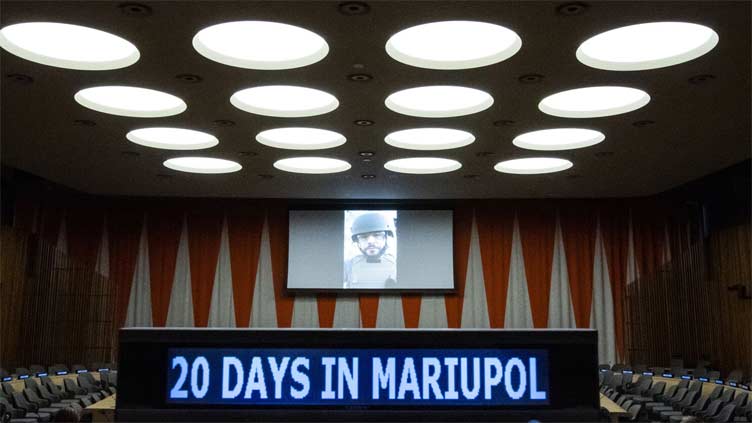More than a hundred ambassadors, journalists and representatives of a broad spectrum of society watched a U.N. screening of the award-winning documentary “20 Days in Mariupol,” which follows a trio of Associated Press journalists during Russia’s relentless siege of the Ukrainian port city in the early days of the war.
U.K. Ambassador Barbara Woodward, who co-hosted the screening, said the film is important because “Russia’s invasion of Ukraine threatens what the U.N. stands for: an international order where the sovereignty and territorial integrity of all countries is fundamental.”
“We want to reaffirm our commitment to U.N. values, and that’s why we’ve chosen to show this very important documentary,” she said in welcoming the audience at U.N. headquarters in New York.
The screening comes at the start of the 78th session of the U.N. General Assembly and a week before world leaders arrive for their annual meeting, where the more than 18-month war in Ukraine is expected to be in the spotlight — especially with Ukrainian President Volodymyr Zelenskyy scheduled to speak in person for the first time.
The harrowing documentary, which was produced by the AP and the PBS series “Frontline,” is culled from 30 hours of footage AP journalist Mstyslav Chernov and his colleagues shot in Mariupol following Russia’s Feb. 24, 2022, invasion of Ukraine and its siege of the city.
It documents fighting in the streets, the crushing strain on Mariupol’s residents and medical teams, and attacks that killed pregnant women, children and others.
The siege, which ended on May 20, 2022, with the surrender of a small group of outgunned and outmanned Ukrainian fighters at the Azovstal steel plant, left the city in ruins and an estimated 25,000 people dead, though the toll is likely higher.
The U.S. ambassador to the U.N., Linda Thomas-Greenfield, the other co-host, said “20 Days in Mariupol” documents “the horrors of (Russian President Vladimir) Putin’s war of aggression.”
“We’re here tonight to bear witness, to bear witness to these horrors and to reaffirm our commitment to justice and peace,” she said. “We must continue to hold Russia to account for its atrocities. We must continue to support the Ukrainian people in their time of need.”
The AP’s reporting from Mariupol drew the Kremlin’s ire, with its U.N. ambassador, Vasily Nebenzia, falsely claiming during a Security Council meeting in the siege’s early days that photos showing the aftermath of a missile strike on a maternity hospital were staged.
“I wish the entire Russian mission were here to watch this film,” said Ukraine’s U.N. Ambassador Sergiy Kyslytsya, who attended Monday’s screening.
Kyslytsya said he believes the documentary is so powerful and important that it will still be shown 50 years from now.
AP Senior Vice President and Executive Editor Julie Pace called the documentary “a testament to the power and impact of eyewitness journalism,” stressing that without it, “the world would not have known the atrocities that took place.”
“To have the film screened at the United Nations as the U.N. General Assembly gets underway underscores the importance of fact-based journalism on a global scale,” she said.
“It’s crucial that we safeguard both the ability of a free press to cover the world’s most important stories and the public’s ability to view this type of fact-based reporting.”
“20 Days in Mariupol” won the Sundance Global Audience Award for Best Documentary and several other prizes. Chernov was awarded the Pulitzer Prize for Public Service along with photographer Evgeniy Maloletka, producer Vasilisa Stepanenko and Paris-based correspondent Lori Hinnant for their “courageous reporting” on Mariupol.
Chernov delivered a video welcome from the field in Ukraine, wearing a helmet and telling the audience that he sometimes feels powerless as a journalist because he can’t change things.
“I can only make sure that as many people as possible will see what I saw … know about what happened in Mariupol and will never forget about it,” he said.
“What was happening in Mariupol is happening right now to other Ukrainian cities, in this moment, and it unfortunately will be happening tomorrow, and the day after tomorrow, until the war is stopped.”
Raney Aronson-Rath, editor-in-chief and executive producer of “Frontline,” called it “deeply meaningful” to have the opportunity to screen the documentary at the United Nations.
She said the producers continue to share the film around the world to give audiences the opportunity to “bear witness to the atrocities that Ukrainians have endured.”
Post Views: 49


 Sports3 months ago
Sports3 months ago
 Sports3 months ago
Sports3 months ago
 Fashion2 months ago
Fashion2 months ago
 pakistan3 months ago
pakistan3 months ago
 pakistan3 months ago
pakistan3 months ago
 World2 months ago
World2 months ago
 World2 months ago
World2 months ago
 Sports2 months ago
Sports2 months ago



















